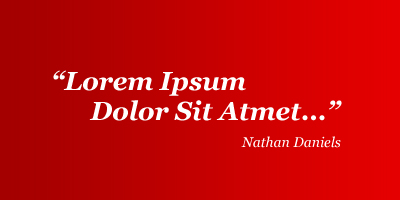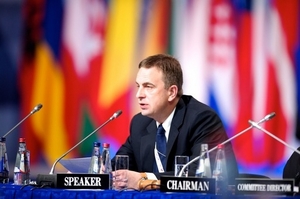| Ārlietu ministra Aivja Roņa runa angļu valodā NATO PA Politiskajā komitejā (29.05.2010) |
 |
|
First of all let me warmly welcome all of you to Latvia. I am honoured to be present at the meeting of Political Committee of the NATO Parliamentary Assembly, especially here in Riga. We are proud to host an event which gathers Members of Parliaments from all of the transatlantic area. We meet in a year, when Allies are contemplating a future vision of NATO for the next decade. This process is taking place in the background of changing and unpredictable security environment. I agree to the Chair of the Group of Experts on the new NATO Strategic Concept, the Honorable Madeleine Albright who has stressed, that “between now and 2020, the Alliance will face a new generation of dangers from sources that are geographically and technologically diverse”. Events of the past years have testified that our vulnerabilities go beyond traditional threats and challenges. I would like to name one issue in particular, and it is economy. Due to the current situation in global economy financial constraints put additional pressure on many countries, and influence decision makers. It is prudent to remember, that without adequate resources and political will the new NATO Strategic Concept will not be effective. In this environment it is important to maintain ability to have a long term view on our common tasks. It is appropriate, that we still maintain that purpose of NATO is “to safeguard the freedom and security of all its members by political and military means”. The cornerstone of the Alliance must remain the principle of collective defence expressed by Article 5 of the Washington Treaty. Likewise we must continue to strive for “a just and lasting peaceful order in Europe”. What is the Latvian view on NATO’s development? Membership in the Alliance has allowed us to look beyond our region. It allows us to act as security providers - investing militarily and financially in international peacekeeping efforts and to share our reform experience with partners. This approach has wide public support, which constantly comprises about 60% of the population convincingly in favour of Latvia’s membership in NATO. We congratulate the recommendations by the Group of Experts on NATO’s new Strategic Concept which were published this month. I have been privileged and directly elevated by my personal participation in the Group of Experts. In my opinion the aim of the new Strategic Concept is threefold: I would like to stress, that the work on the new Strategic Concept is a process – strategic debate among the allies – upon which the document will depend. It must be carried out in a way that strengthens Allied unity and solidarity. It is essential to achieve common understanding among our people – we all should feel ownership of the new Strategic Concept. National Parliaments play a central role here. Not least through raising the level of public understanding about NATO’s goals and tasks. One of the recommendations of the Group of Experts deals with NATO-EU cooperation. It is in no way a novelty. In order to be effective in our approach to security, we must ensure full complementarity between NATO and the EU. Parliamentary dialogue can be the necessary foundation. Another recommendation speaks of insufficient European defence spending and investment. This is yet another issue where National Parliaments hold the key. Likewise we need to keep the scope and intensity of the transatlantic dialogue. A single voice of the European Union is particularly important in this regard. Recommendations also touch upon new threats and challenges. Cyber and terrorist attacks, proliferation of the Weapons of Mass Destruction prove that different types of challenges continue to exist in Europe. We congratulate the Lithuanian initiative to launch a Centre of Excellence on Energy security and we support the existing Estonian Centre of Excellence on Cyber defence. No country can tackle these threats alone. Latvia can deal with them through the most successful collective defence organisation ever. We should be more active in using provisions of Article 4 of the Washington Treaty, which provides us with consultation mechanism. In a longer term perspective the Allies should move towards common security and defence policy using the opportunity provided by discussions on the new Strategic Concept. Creative and practical approaches should be undertaken to strengthen common security perceptions. We have always regarded the United States as our key strategic partner and ally. The same is true in a broader context when we look upon the transatlantic process. We strongly believe in the necessity to sustain a close, regular transatlantic partnership and its role in dealing with the modern threats globally and regionally. One of the main fields of activity for NATO in the past decade has become operations and in particular Afghanistan, which I visited just recently. International community has clearly reiterated commitment towards Afghanistan on various occasions this year, including the London conference and Tallinn NATO ministerial, other high level events are still forthcoming. Reintegration and reconciliation efforts of the Afghan society, fair and transparent parliamentary election process are crucial for our common success. It is essential to provide irreversible transition process towards full Afghan responsibility for the security of their own country. Successful implementation of the transition phase is a cornerstone for the entire operation in Afghanistan. One of our goals is to contribute to building Afghan capacity by paying a considerable attention to strengthening of the Afghan National Security Forces, both Army and Police. Latvia is also looking into other possibilities to increase our contribution, particularly in the civilian sector. The well-established and effective Northern Distribution Network is an additional contribution to the mission in Afghanistan. We hope that an increasing number of ISAF countries will use the advantage of the transit route via Riga. Furthermore, we would like to see this route also developing in reverse direction namely bringing goods from Afghanistan and wider region to Europe. I would like to touch upon another topic, which is important for lasting stability and peace, - arms control, disarmament and non-proliferation. The agenda we face today has a global echo and coping with challenges requires constructive engagement and political will. We already see some good examples - negotiations on reductions in strategic arms and signing of the new START Treaty. The Nuclear Security Summit has showed the readiness of the international community to work together against nuclear terrorism and proliferation of nuclear materials and technologies. The Nuclear Non-proliferation Treaty’s Review Conference is a litmus test to examine the level of constructive efforts towards global security. We are on the right track. The window of opportunity is open and we should not lose the momentum of building trust and confidence in relations with our partners. A clear line should be drawn between acquiring of capabilities for legitimate self-defence as opposed to arms race. The concept of confidence and security building measures may be a useful instrument in addressing various kinds of global and regional security issues. Restoring trust and confidence should be a priority task in NATO relations with Russia. We are committed to work in the NATO-Russia Council in order to move forward on practical cooperation and political issues underlying our relations. NATO Secretary General has initiated a joint review of the 21st century challenges. This process has allowed us to identify areas where our security interests overlap - Afghanistan, terrorism threat, proliferation of Weapons of Mass Destruction, piracy, search and rescue at sea. We should continue exploring ways of cooperation in those areas. As to the political issues, we are fully committed to make full use of the NRC as a forum for open discussions. The experience of previous enlargement is a positive example of involvement of the new states in the NATO security dialogue. Allies need to ensure the continuity of open-door policy so every European country that meets criteria could become a member. The existing Strategic Concept is still valid in defining the aim of partnerships, with emphasis on increasing transparency, mutual confidence and the capacity for joint action with the Alliance. We should continue, where appropriate, to strengthen security dialogue with partners as a means to make positive impact on the security environment. Ad-hoc arrangements and flexible formats for consultations with members of the Euro-Atlantic Partnership Council, Mediterranean Dialogue or the Istanbul Cooperation Initiative and interested Contact Countries should be used. Finally, let me say, that this year will mark the 5th year anniversary of the Riga conference. It is a tradition initiated by the 2006 NATO summit in Riga to gather respected governmental and non-governmental intellectuals. We hope that this conference will help to contribute to the strategic debate which will be ongoing in the preparations for the NATO Lisbon Summit. |




 Honourable Members of Parliaments,
Honourable Members of Parliaments,